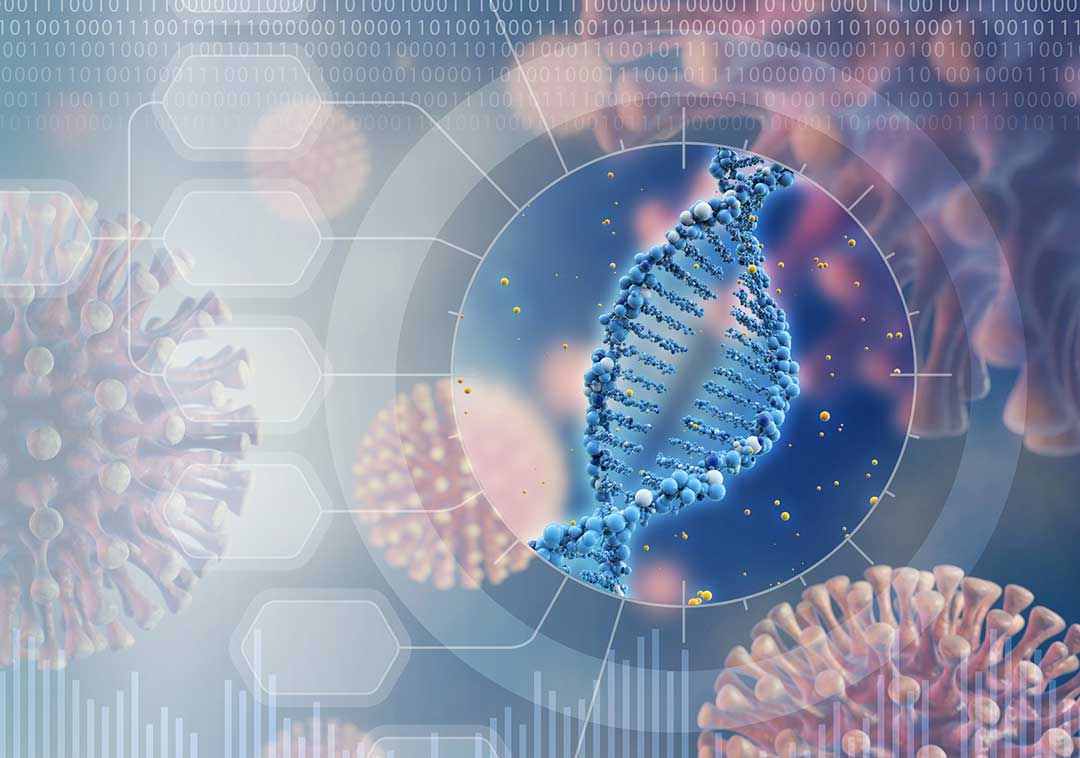Continued mutations of SARS-CoV-2 may lead to changes in COVID-19 diagnostic testing.
As the global pandemic continues to develop, the virus that causes COVID-19, SARS-CoV-2, has almost become a household name. The virus itself is many times talked about as an individual entity, however, many different variants of SARS-CoV-2 have emerged as mutations have developed.
To learn about existing mutations of SARS-CoV-2 and the implications that emerging variants could have on clinical laboratories, the COVID-19 STAT Intelligence Briefings Service spoke with Joel Lefferts, PhD, HCLD, DABCC. Lefferts is Associate Professor of Pathology and Laboratory Medicine at Geisel School of Medicine at Dartmouth and is the Assistant Director of Clinical Genomics and Advanced Technology (CGAT) at Dartmouth-Hitchcock Medical Center (DHMC).

Through his work at Dartmouth-Hitchcock’s Geisel School of Medicine, Dr. Joel Lefferts (above) is investigating variants of SARS-CoV-2, the virus that causes COVID-19. As testing variants better develops as a result of genomic sequencing technologies, pathologists such as Lefferts and other medical scientists anticipate drawing more conclusions about important factors that shed light on the global transmission of the SARS-CoV-2 virus and that advance the field of precision medicine in population health. (Photo used with permission.)
Lefferts spoke to STAT COVID-19 about the variants of SARS-CoV-2 discovered through the work at DHMC. “We’re sequencing a small subset of the virus to see what the general distribution of variants or mutations are,” Lefferts said. “What we’re seeing, compared to the original Wuhan sequence, is 5 or 6 variants that are found in probably 30-70% of our patients’ viruses. Then we have a large number of variants that are seen less frequently in smaller groups of individuals. Another interesting finding is that some samples have variants found at low levels, suggesting either infections due to multiple exposures or, perhaps more likely, mutations that are occurring during the course of an infection.
Investigations Expand to Identify SARS-CoV-2 Mutations and Their Impact
The testing of SARS-CoV-2 variants is at an early stage of development, according to Lefferts. “We haven’t really been at the point of looking at comparing sequence to disease severity,” he explained. “That’s our next step that we’re waiting to get IRB approval for, but it’s definitely an interesting question—are we going to see that certain mutations would result in more severe symptoms or different types of symptoms?”
Do Emerging SARS-CoV-2 Mutations Affect PCR Test Results?
“We looked at our population for variants that would interfere with binding of the CDC primer and probe sequences, for example,” Lefferts told STAT COVID-19. “When we did that, we only found one sample that had any variants within those primer or probe binding sites, but it was not near the 3’ end of the primer binding site, so it might not lead to false negative results.”
Mutations of SARS-CoV-2 do not seem to affect the results of current PCR testing, Lefferts said. This is promising, but the news does come with a caveat. “We are only sequencing cases that are found to be positive and are identified with our clinical diagnostic testing,” Lefferts cautioned. “If there are cases out there that are not being picked up because of mutations, we may be just not selecting them for sequencing because they’re coming up negative.”
Still, the possibility exists of missed SARS-CoV-2 mutations (e.g. negative test result, thus not sequenced). However, Lefferts viewed this an unlikely scenario because of the various testing options and targets being used. “The Abbott assay that we’re using has two different targets, and those two targets are different than the CDC targets,” Lefferts said. “If one site was mutated, we’d pick it up with the other, but we’ve only compared our sequence data to the CDC primer and probe sets, which we are not routinely using.”
Clinical laboratory leaders should be aware of the SARS-CoV-2 mutations that have been identified and where. In at least one case, a mutation has affected RT-PCR primer binding sites. Although our understanding of the genetic variants of SARS-CoV-2 is limited, clinical laboratory directors should consider that COVID-19 testing may have to adjust for novel strains, and that may affect testing capabilities in the future.

—By Caleb Williams, Editor, COVID-19 STAT
Related Resources:
DHMC Department of Pathology and Laboratory Medicine
Genomic surveillance reveals multiple introductions of SARS-CoV-2 into Northern California






